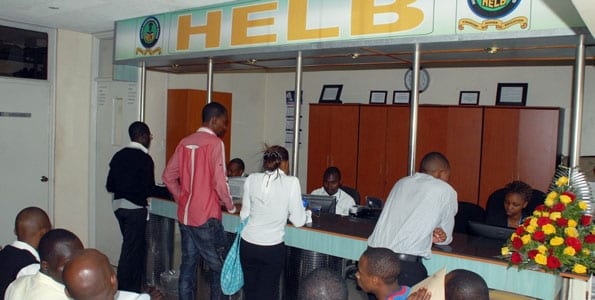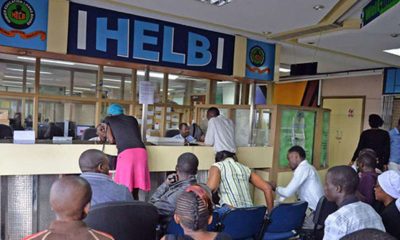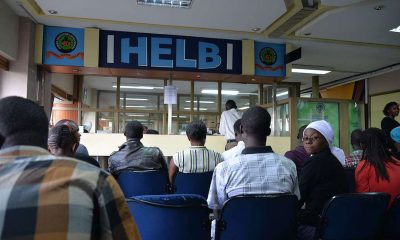News
HELB: Covid-19 Pandemic pushed 106,443 to default loans

More than 106, 443 former university students have defaulted on their Higher Education Loans Board (Helb) after the Covid-19 pandemic ravaged businesses and triggered massive layoffs.
Data from Helb shows loan defaults went up by 35, 561 in the six months to December with the defaulted loans climbing to 55 % which represents Sh3.7 billion to Sh10.4 billion. The increased defaults paint the dire situation faced by beneficiaries who were their loans with their payslips or cash flow from their own businesses.
The spike in loan defaults has weakened the Helb’s ability to support needy university and technical college students, prompting allocation cuts and requests for some Sh8.6 billion additional funding from the National Treasury.
Matured loans have risen to Sh45 billion giving the Charles Ringera led agency a non performing ratio of 23% which is way above the banking average of 14.1%.
“As at December 2020 Sh10.4 billion was held by 106,443 loanees, a sharp rise from the Sh6.7 billion held by 68,882 loanees as of June 30, 2020, mainly attributed to retrenchment as a result of Covid-19,” said Ringera.
Helb was designed as a revolving fund where beneficiaries who have completed studies pay back the loans to make it possible to support a fresh students joining campus but it has been affected by hiring freeze and reduced corporate earnings occasioned by Covid-19 pandemic.
The prevailing situation has now pushed lawmakers to increase the grace period for loan repayment from four to five years after graduation to enable beneficiaries to set a stronger financial base.
Repayment starts one year after completion of studies or risk blacklisting with credit reference bureaus for defaulting. The short repayment period has been linked to the growing list of defaulters at the HELB.
The beneficiaries are expected to clear their loans within four years but the situation in the job market plagued by the pandemic has hit young employees. Data from the Kenya National Bureau of Statistics (KNBS) shows that workers between the ages of 20 and 29 years accounted for over 60% of the jobs lost in 2020.
KNBS report is a reflection of the effects the pandemic had on businesses during its peak when restrictions including travel restrictions, mass gathering and a dusk-to-dawn curfew.The raft of measures imposed to curb the spread of the virus saw the economy shrink by by 5.7 % in the three months to June 2020, its first quarterly reduction since the global recession of 2008/9.
By July last year up to 25,626 beneficiaries of the Helb had re-negotiated or stopped payments due to the impacts of covid-19 pandemic that affected their ability to service their loans.
But Helb is opposed to the Parliament proposal to cut interest rates on students’ loans by 1% arguing that the move points to 3% annually which could see them make a loss of Sh693 million.
The agency boss Mr Ringera has also warned that the shortfall will force them to cut the number of students benefiting from loans by 18,730, a move that will hurt the quest of many young Kenyans to achieve higher education.
Parliament’s committee on Education and Research told the Budget and Appropriations Committee (BAC) that Helb has been insufficiently funded to meet the needs of the bulging number of students relying on theloans fees, food and accommodation as it asked the Treasury to provide Sh8.6 billion to the agency from July 1.
“The committee observed that there is underfunding which has inhibited service delivery in learning institutions and other critical institutions such as…Higher Education Loans Board,” BAC chairman Kanini Kega said in the report.
Kenya Insights allows guest blogging, if you want to be published on Kenya’s most authoritative and accurate blog, have an expose, news TIPS, story angles, human interest stories, drop us an email on [email protected] or via Telegram
-

 News1 week ago
News1 week agoTHE FIRM IN THE DOCK: How Kaplan and Stratton Became the Most Scrutinised Law Firm in Kenya
-

 Investigations2 weeks ago
Investigations2 weeks agoMulti-Million Dollar Fraud: Three Kenyans Face US Extradition in Massive Cybercrime Conspiracy
-

 Economy2 weeks ago
Economy2 weeks agoIran Demands Arrest, Prosecution Of Kenya’s Cup of Joe Director Director Over Sh2.6 Billion Tea Fraud
-

 Africa2 weeks ago
Africa2 weeks agoFBI Investigates Congresswoman Ilhan Omar’s Husband’s Sh3.8 Billion Businesses in Kenya, Somalia and Dubai
-

 Business2 weeks ago
Business2 weeks agoA Farm in Kenya’s Rift Valley Ignites a National Reckoning With Israeli Investment
-

 Grapevine6 days ago
Grapevine6 days agoA UN Director Based in Nairobi Was Deep in an Intimate Friendship With Epstein — He Even Sent Her a Sex Toy
-

 News2 weeks ago
News2 weeks agoTragedy As City Hall Hands Corrupt Ghanaian Firm Multimillion Garbage Collection Tender
-

 Arts & Culture2 weeks ago
Arts & Culture2 weeks agoWhen Lent and Ramadan Meet: Christians and Muslims Start Their Fasting Season Together


























